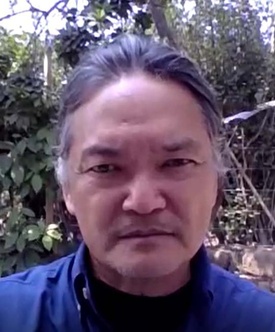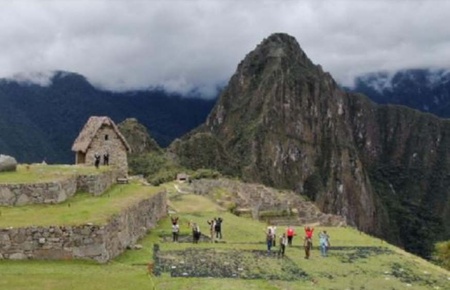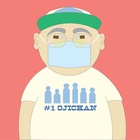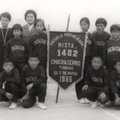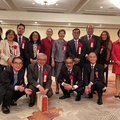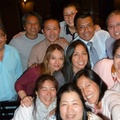A year ago, one of the most rigorous quarantines in the world was imposed in Peru to slow the spread of the new coronavirus. It has been a painful and terrible year for a country decimated by the pandemic and morally devastated by a scandal that involved a former president and two former ministers who abused their positions of power to get vaccinated clandestinely while thousands of people died.
Throughout the year, one of the specialists most consulted by the media has been the social psychologist Jorge Yamamoto, to analyze the behavior of Peruvians and their ruling caste.
What assessment does the analyst make of these twelve months of pandemic? The psychologist warns of the “impressive onslaught of anti-values”, expressed in the disobedience of the rules by citizens and the corruption of politicians.
“The behavior of violating the norm was already something known in Peru, but now it takes on a suicidal nature. People are told that there are rules for their own survival, but they do not comply with them and end up infecting themselves and infecting their older adults, with Peru becoming world champion in mortality from covid for several months," he says.
For this reason, he emphasizes “the enormous need to work on citizen behavior, especially values.”
Regarding the former members of the Peruvian government who were secretly vaccinated, among them a former Minister of Health who publicly said that as a “captain” she would be the last person to be vaccinated (when she had already been secretly immunized), and who criticizes her “carativism.” ”, his vileness denotes the “tremendous crisis of values” that Peru is going through.
What goes through the head of a politician who lies and lies, who persists in denial even when the truth is rubbed in his face? Jorge Yamamoto alludes to what he calls “moral disconnection. What does it consist of? In generating a buffer between reality and ourselves. It is as if one were drugged, one is not fully conscious and that is one of the psychological processes that has been most associated with corruption.”
And just as the lies of the rulers are incomprehensible despite the evidence that clearly refutes them, certain behaviors of the population are also difficult to understand, such as people who celebrate funerals of a relative who died from coronavirus with alcohol and dancing, shooting the risk of becoming infected.
“That is a sign of extreme lack of conscience, not in the moral sense, but in the psychological sense. We can act automatically, without reasoning, without turning on the front part of the brain, based on a series of automatic mechanisms, as amoebas, protozoans do. What's happening? I have the death of a loved one, automatic emotional reaction: grief. Automatic reaction to relieve grief: get together with friends and dance. Automatic reaction: the funeral rites I always practice. Then the brain is not activated,” he explains.
REFLECTION OF SOCIETY
Citizens in Peru exploded with indignation when the vaccine scandal was uncovered. However, the truth is that the politicians and authorities of a country are a reflection of the people who govern.
“The problem is that the majority of Peruvians in large cities would have acted in the same way and those who would not have accepted the vaccine or those who would not have distributed (the vaccines) would have been exceptions that confirm the rule,” he says. the psychologist.
Thus, corruption is not the exclusive property of the political class, it is entrenched in society. “This is how corruption works from its cultural roots,” says Jorge Yamamoto. “For this reason, an anti-corruption plan must not only be seen as a legal issue, but also as a psychosocial issue, as an issue that is rooted in culture. We are not aware of when we are transgressing the norm, and from there come these cynical justifications: 'I cannot afford to get sick', 'I have a high risk', and in those I end up vaccinating six of my relatives 1 ”, Add.
The allusion to the inhabitants of large cities, most of whom would have been vaccinated surreptitiously if they had had the opportunity, is not gratuitous. The Nikkei psychologist, who has studied small communities in the Andes and the Amazon of Peru, maintains that vileness like the one described would not be possible in these communities. “There is a high awareness,” he points out.
In contrast, in cities like Lima, and even in medium-sized cities, there is “a war of everyone against everyone. What does that generate? Emotional numbness, the effect of which is to reduce consciousness.” There is no solidarity, respect for others.
POSITIVE LOOK
Although he is sometimes called a pessimist for his stark diagnoses about the situation and reality of the country, Jorge Yamamoto bets on and promotes optimism, but not the irrational optimism of someone who believes he is immune to threats and goes to a party because he is convinced that It is not going to be contagious, nor is the deluded optimism of someone who says “everything is going to be fine”, as if the mere enunciation of a wish was enough to transform it into reality, as if the words were a magic wand.
No, he defends an optimism related to “resilience and the ability to adapt,” and that “starts from realism, which realizes where it is stepping and says 'this is not going to defeat me, I am going to find a concrete way to to be able to get ahead'. That is the optimism we need,” he explains.
Peru has a dark side, but also a bright side. “We should not be left with this feeling of horror, of getting your visa and every man for himself, but rather (this) should be seen as a challenge that we have to do something because this is a great country, with beautiful natural landscapes, with hard-working, honest people (especially in small traditional communities), with ingenuity. What happens if that ingenuity is oriented towards good and not evil, if we simply realize that we all win if we maintain a few rules of behavior, and if instead of hacking each other and envying each other, we start working together helping each other. That is going to be the best act to save the country,” he says.
It's a matter of focus. When the vaccine scandal became public, the media and the population went on the hunt for those who had irregularly benefited from them. And what about those who could have agreed to the vaccination and had the fortitude to refuse? In the midst of so much putrefaction, couldn't they serve as moral examples, as models for building values?
"We should look for those few who said 'no, that's wrong and I don't do it.' We should locate and interview them, and understand how they have been trained at home, what their reasoning has been, because they were the exception to this evil. There we are going to have a series of central points to develop effective anti-corruption plans, for the good of the country."
If we look at the glass half empty, we notice that during the pandemic, according to studies carried out by Jorge Yamamoto and his research team, in the face of the crisis and the scarcity of resources, the family unit has retreated, driven by individualism. Family violence has also increased.
However, if we look at the glass half full, we discover that an important sector of the population has strengthened their family ties and learned to value their relatives.
“I was recently talking to a friend, a successful businessman, and he told me 'now I don't care about being rich, I just want to be happy.' I realize how much nonsense I bought, nonsense for me, for my wife, but it was just to show off. Now I am understanding that happiness has to do with family unity.' That is an example of how there are people who are finding what is really important and have made a leap in their quality of life,” reveals the Nikkei expert.
CRUSADE FOR VALUES
How to get out of the quagmire in which we are sunk? How do we rescue the country from corruption and anomie?
Jorge Yamamoto proposes a national plan of values to move forward, with the participation of powerful groups, such as companies and the media, in a long-term, decade-long effort, driven by “a resilient, antidepressant optimism that It helps the individual and the community to have reasonable hope.”
Values embodied in people like those who rejected the undue privilege of getting vaccinated and who can “give people a healthy optimism, tell them 'look, yes it was possible'. And how did they do it? Because probably from a young age their parents gave them clear training, based on example, with warmth but with structure.”
By changing ourselves, being better people, better citizens, we can change the country.
“I can't change Peru, but I can change myself and I can change my family. I can educate my children in values as a first priority, and perhaps I start to get together with friends who share these values, and thus the children see a homogeneous example,” he says.
The example can escalate from family and friends to the workplace and, later, to other areas.
“In my company I can begin to promote these principles to improve the quality of life and personal quality of my collaborators. The effect will be that they will work better, they will be more honest. And suddenly we extend the message to the chain of suppliers, to the clients, and we could create islands of productivity, and change Peru person after person, client after client, family after family.”
Note:
1. The former Minister of Foreign Affairs of Peru secretly received the vaccine and justified herself by claiming that she could not afford to get sick. A former vice minister of Health not only got vaccinated, he also had his wife, his children, his sister and his nephews vaccinated.
© 2021 Enrique Higa Sakuda


